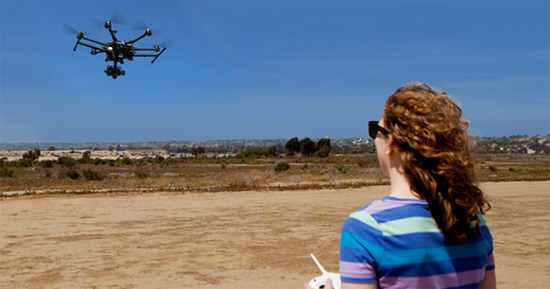 The new South African drone legislation comes into effect on 1 July 2015 and sellers will be required to make the buyers aware of it.
The new South African drone legislation comes into effect on 1 July 2015 and sellers will be required to make the buyers aware of it.
Drones were among the most popular searches on bidorbuy during the Christmas 2014 shopping period. Their popularity continues, with at least one unmanned aerial vehicle or remotely piloted aircraft, as drones are also known, being sold on the site each and every day.
However, all who bought them would perhaps do well to keep the parcel unwrapped until 1 July 2015, when the new South African drone legislation comes into effect. Flying a drone before that date might be unlawful.
In a nutshell, the new set of rules say that the person who operates a drone must have a CAA (Civil Aviation Act) issued remote pilot licence as well as a letter of approval to operate a drone. Approval letters will be valid for 12 months at a time.
As things stand now, proof of licence will not be a prerequisite for purchase. However, when selling a drone, the seller is obligated to inform the buyer about the requirements as stipulated in the SACAA regulations.
Although most of the rules apply to flying drones for commercial purposes, private drone owners are also bound by some of the regulations. For example, they need to know that they may not, among other things: operate drones in bad weather, when the view of the drone is obstructed; use a public road for the take-off or landing of a drone; use drones to transport cargo or to make deliveries; fly drones more than 400 feet (120 metres) above the ground, nor within 10 kilometres of an airport; fly drones within 50 metres above or close to a person or a structure without a prior approval by SACAA; operate a drone in controlled airspace (near airports, nuclear plants, prisons, etc.); perform aerial or acrobatic displays; and so on.
Also, all incidents involving a drone, especially where there is any injury to a person or damage to property, must be reported.

Those flying drones in commercial, corporate and non-profit operations are bound by additional regulations, such as registering each drone when purchased, writing exams, obtaining operating licences, and keeping logs of flights.
The new drone flying regulations make South Africa a forerunner in this field, in Africa as well as in the world. The aim is to ensure that the benefits of the “drone revolution” do not outweigh the risks to privacy and safety and it is to be expected that the rules will evolve as technology develops and as new benchmarks are set by relevant national and international bodies.
The drone legislation does not relate to toy aircraft, unmanned free balloons or other types of aircraft which cannot be managed on a real-time basis during flight.
Currently, the remotely piloted aircraft systems page on the SACAA website is under review, so make a note to visit it sometimes in future.








